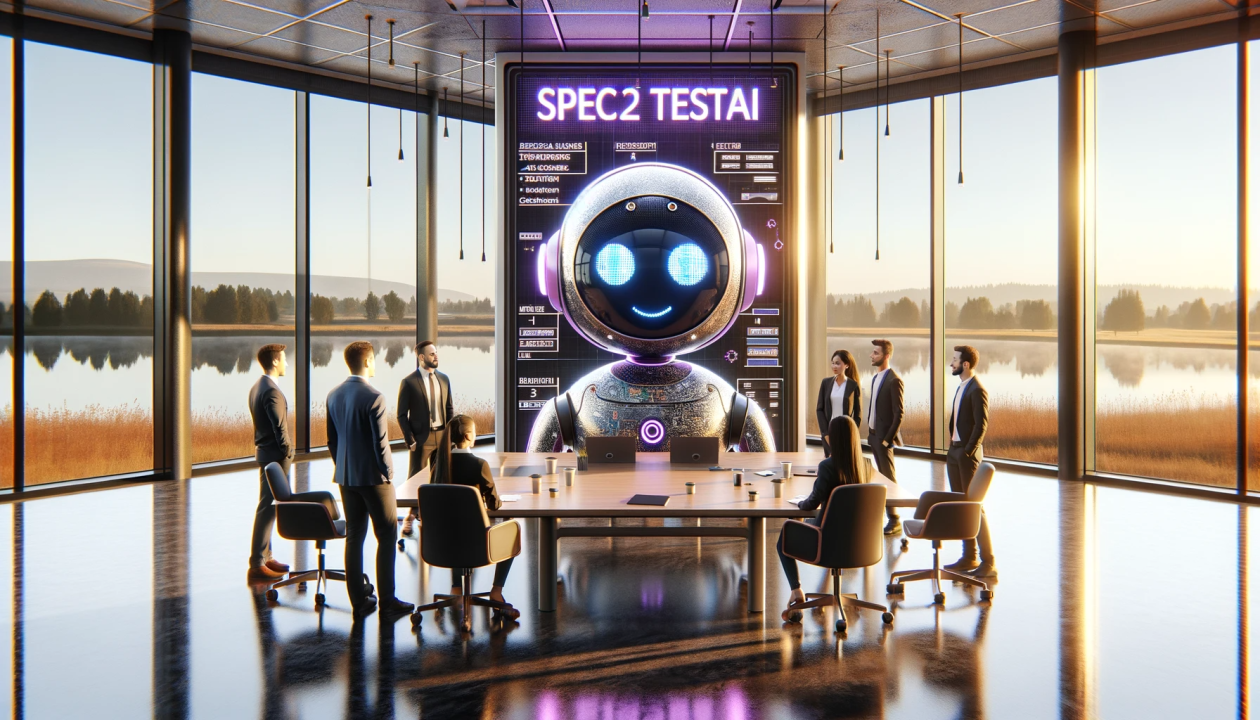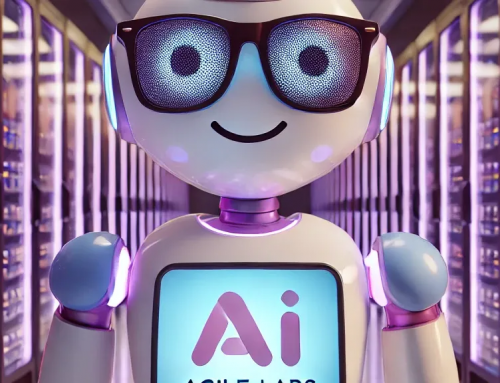Blog
Revolutionizing Test Automation with Spec2TestAI™: A Leap Towards Intelligent Testing
Scot Aziz | April 15, 2024
Transforming Test Automation: Introducing Spec2TestAI’s Groundbreaking Upload Feature
At AgileAI Labs, we’re continually pushing the boundaries of test automation technology. Our platform has consistently saved test automation teams countless hours by transforming manual test cases into robust frameworks. Today, we’re excited to announce a revolutionary update that further enhances our AI engine’s capabilities.
Upload Your Test Automation Libraries for Unprecedented Efficiency
Our latest feature allows users to upload their own test automation libraries from a variety of languages, including Selenium/Java, Appium/JavaScript, Robot/Python and more. This isn’t just an enhancement; it’s a transformation of how automated testing code is generated from manual test scripts. By integrating your existing testing frameworks, our AI now tailors the generation of automated test cases to align seamlessly with your specific practices, dramatically increasing accuracy and reducing the time your team spends writing automated testing code.
Realize Automation Within Your Current Sprint
Say goodbye to Sprint +1 readiness delays. This common challenge in Agile environments occurs when teams can’t complete necessary test automation within the same sprint as development. Our new feature tackles this head-on, enabling real-time automation readiness that keeps pace with your sprint timelines.
This delay in automation readiness can lead to several challenges:
- Delayed Feedback: One of the core advantages of test automation is the rapid feedback on the health of the application being developed. Sprint +1 readiness delays this feedback, potentially allowing defects to linger in the codebase longer than necessary.
- Resource Bottlenecks: If automation efforts are consistently lagging behind development, it can lead to bottlenecks where testers are waiting for the development of new features to be completed or, conversely, developers are waiting for automation tests to catch up.
- Increased Technical Debt: Postponing test automation can lead to an accumulation of technical debt. As more features are developed without accompanying automated tests, the risk and effort required to ensure quality assurance increase.
- Impact on Continuous Integration/Continuous Deployment (CI/CD): For teams practicing CI/CD, the delay in test automation can hinder the efficiency of the deployment pipeline, as automated tests are crucial for validating builds in CI/CD environments.
Spec2TestAI™ can significantly mitigate the sprint +1 readiness issue by enhancing the efficiency and speed of test case generation and automation. By leveraging AI to quickly generate relevant and tailored test automation scripts based on existing test libraries and patterns, teams can ensure that test automation keeps pace with development within the same sprint. This not only supports a more Agile testing approach but also helps maintain the integrity of the CI/CD pipeline, reduces technical debt, and enables faster identification and resolution of defects.
The Power of Automated Testing Code Reuse and AI in Enhancing Test Quality
From an architectural standpoint, the benefits of software reuse are many, spanning efficiency, cost reduction, and a substantial decrease in time to market. However, Spec2TestAI™ transcends these conventional advantages by leveraging code reuse as a mechanism for defect prevention. Drawing upon the insights of Capers Jones, it’s evident that reusing code not only streamlines development efforts but also minimizes the likelihood of defects, thanks to the repeated use of proven, debugged code.
The integration of AI further elevates this capability. By learning from the uploaded automation libraries, Spec2TestAI™ generates automated tests that are far from generic. They mirror the organization’s specific coding practices, making each test case a reflection of the collective intelligence and experience embedded within your codebase.
Before and After: A Glimpse into the Transformation
Consider the transformation in a practical scenario:
Before: Testing scripts were manually written, often resulting in redundant effort and a disconnect between manual testing practices and automated test scripts. The process was time-consuming, prone to human error, and often resulted in a backlog of test cases awaiting automation.
After: With Spec2TestAI’s new upload capabilities, the platform generates automated test scripts that incorporate the organization’s common methods and practices right from the start. This not only ensures consistency between manual and automated tests but also significantly reduces the manual effort involved in scripting and debugging.
This shift is not just about efficiency; it’s about enabling teams to focus on innovation and quality, leaving the repetitive and error-prone aspects of test case generation to Spec2TestAI™.
Embracing a Future of Intelligent Testing
This update is a testament to our commitment to pushing the boundaries of what’s possible in software testing, ensuring that our platform not only meets the needs of today’s development teams but also anticipates the challenges of tomorrow.
To our users, this feature represents more than just an upgrade; it’s a catalyst for transformation, enabling a shift towards more intelligent, efficient, and effective testing processes. There are significant improvements and benefits that stem from integrating Spec2TestAI’s new features into the testing process.
Key Improvements of the Spec2TestAI™ Automated Testing Generation Capabilities
In this example, we are using sample code from a Robot framework uploaded file that consists of some common methods that a typical automation team would keep in their library. Specifically. the utilization of pytest fixtures for setup and teardown, along with a focus on discrete, purpose-driven test functions, reflects a streamlined and efficient approach.
- Modular Design: The use of pytest fixtures for common setup and teardown tasks reduces redundancy and promotes code reuse.
- AI-Enhanced Test Generation: Spec2TestAI’s understanding of common methods and patterns leads to automated test cases that are more aligned with organizational practices.
- Increased Efficiency: The automation of test case generation, particularly for repetitive or boilerplate code, significantly reduces manual scripting efforts.
Comparative Benefits:
- Efficiency in Test Creation: The AI’s ability to learn and replicate organizational testing patterns means that common methods and assertions are automatically included in new tests, drastically reducing the time spent on manual test development.
- Enhanced Code Reuse: By integrating common testing libraries and methods, there’s a significant reduction in redundancy. This not only speeds up the test development process but also ensures consistency across tests.
- Defect Prevention: Leveraging tried and tested methods within the automated tests reduces the risk of introducing new defects into the testing code itself. As Capers Jones has pointed out, software reuse is a potent defect prevention strategy.
- Tailored Automation: The AI engine’s capability to generate test cases based on the uploaded test automation libraries means that the generated tests are not just generic scripts but are tailored to mimic the organization’s specific testing patterns. This results in more accurate and relevant test automation.
- Focus on Critical Testing Areas: With the mundane and repetitive aspects of test case creation being handled by AI, test engineers can focus their efforts on more complex and critical testing areas, potentially uncovering deeper insights and defects.
- Rapid Adaptation to Change: As testing libraries evolve, Spec2TestAI can quickly adapt, generating new tests that incorporate the latest testing strategies and methodologies, thereby keeping the test suite current and effective.
Conclusion:
The transformation that results from being able to upload automated testing library files which allow our AI engine to learn is ground-breaking. This AI-enhanced, modular test automation represents a significant leap forward in testing efficiency and effectiveness. Spec2TestAI’s new automated testing upload capability not only facilitates a smoother and faster transition to automation but also enhances the overall quality of the testing process through intelligent reuse of code and adherence to proven testing patterns. This shift not only reflects best practices in software architecture and testing but also positions teams to better meet the demands of modern software development cycles.







